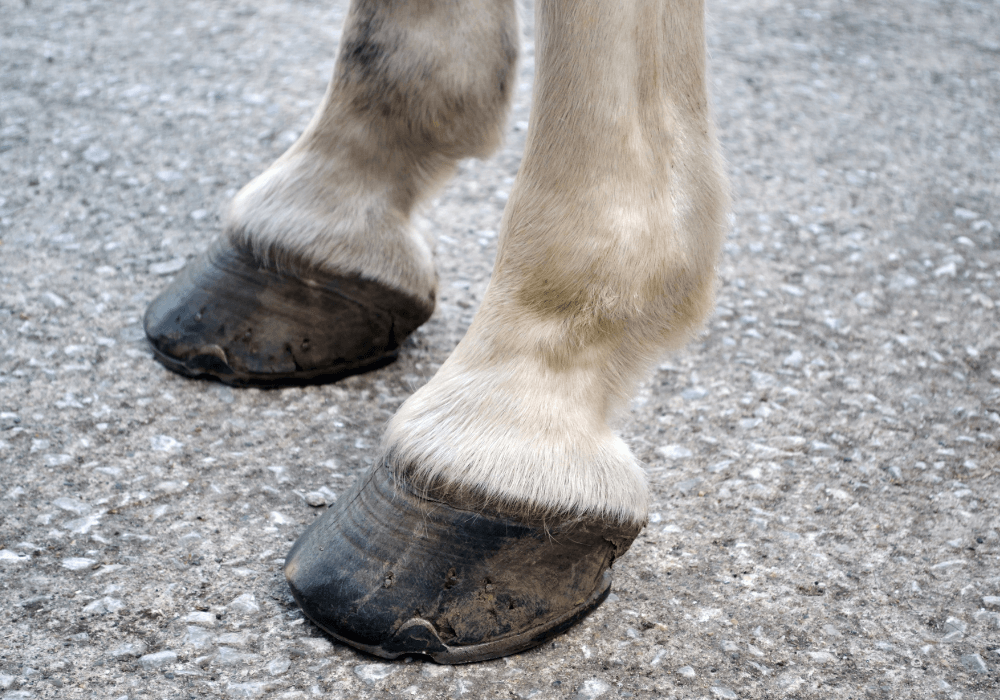“No hoof, no horse” may be an age-old saying, but it remains relevant today. Regardless of your discipline or level, and even if your horse is retired or a non-ridden companion, equine foot care is crucial to overall health and wellbeing. Not only can unhealthy feet cause poor performance, they can also lead to more complex problems and severe pain and discomfort for the horse. Keeping your horse’s feet healthy requires daily management, and in this blog we are going to highlight some of the things horse owners can do when it comes to equine foot care.
Daily Equine Foot Care: Picking Your Horse’s Feet Out
Regardless of whether your horse lives in the field or stable, their feet should be picked out at least once per day. This allows you to monitor their feet and maintain good hygiene. Your horse’s feet should be checked for splits, cracks and any stones. If your horse has shoes, they should be checked for general wear and that they’re in the correct position.
The Impact of the Environment on Horse Hoof Health
The weather can have a drastic effect on the condition of your horses’ feet. The hoof wall expands during wet conditions and contracts during dry. It is important to notice these changes in your horse’s feet and adjust their routine if you notice their feet are too hard or soft. Sometimes it may be appropriate to apply a topical hoof dressing to help protect against drastic changes seen in British weather.
The environment your horse is kept in can have a drastic impact on their feet. For example, if they are standing in wet/muddy conditions they are put more at risk of diseases such as foot abscesses and mud fever. If possible, have your horses turned out on dry paddocks and ensure they are in clean regularly mucked out stables when in.
Winter presents its own set of challenges when it comes to caring for your horse's feet. Check out our winter horse care guide to learn more about how to care for your horse's feet in winter.
Diet and Hoof Health
Your horse’s diet directly impacts the health of their hooves. Feeding a balanced diet will promote healthy hoof growth. However, it is important to manage your horse’s weight correctly. Horses that are overweight or obese are at greater risk of developing laminitis, which is an extremely painful condition of the hooves. It is important to restrict your horse’s grazing if you suspect they are putting on weight. On the other hand, horses that are too thin are potentially not getting enough vitamins and minerals, which puts them at risk of having weak hoof walls. Your vet or farrier can advise you if your horse’s hoof walls are not in top condition and how this can be improved.
Regular Visits from the Farrier
Selecting a good farrier is essential for maintaining the health of your horse’s hooves. It is paramount that you select a farrier who is registered with the Farriers Registration Council (FRC). Only Registered Farriers, Enrolled Farriery Apprentices or persons undergoing Council approved courses, Veterinary Surgeons or trainee Veterinary Surgeons working under supervision and persons giving first aid in an emergency situation to a horse may practise farriery legally. Registered farriers have gone through extensive rigorous training to be able to provide your horses with essential hoof care. If you are looking to find a farrier, registered farriers can be found in the Farrier Registration Council’s Find a Farrier.
The Importance of Good Foot Balance in Horses
Farriers are able to trim your horse’s hooves to maintain good foot balance, which is essential for keeping your horse sound. If you or your farrier suspects that your horses hoof balance is not quite right then veterinary surgeons are able to take x-ray images of your horses’ feet in order to guide the farrier if corrective trimming needs to be performed. If this is something that interests you or if you would like to have a chat with one of our vets, don’t hesitate to give us a call.
Avonvale Equine Vet Practice
We are an independent, equine-only vet practice based near Banbury and serving the surrounding areas, including the Cotswolds, Gloucestershire, Warwickshire and Worcestershire. We operate a free weekly zone visits scheme, which is ideal for routine, non-emergency appointments. Register your horse, pony, donkey or mule with us online today, or feel free to call us on 01295 670 501 for more information. If you have multiple horses, or you own / manage a commercial yard or equestrian business, please give us a call to discuss your specific requirements.








